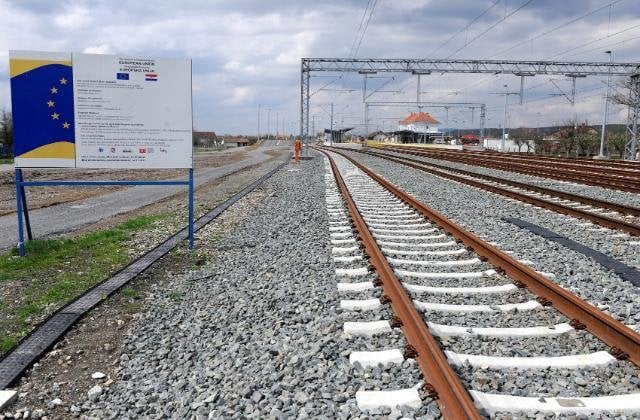Enrico Letta wants railways to help Europeans fall back in love with the single market
Today, the Community of European Railway and Infrastructure Companies (CER) & the Jacques Delors Institute hosted a high-level debate at the European Parliament, focusing on the strategic development of the transport sector with rail at the core of a resilient and sustainable system.

The event, which was hosted by MEP and EPP Vice-Chair Massimiliano Salini, explored the synergies between the recent report 'Much more than a Market', commissioned by the EU Council to assess the fitness of the EU Single Market, and the European Rail Sector's vision for well-functioning rail passenger and freight services in a high-capacity rail infrastructure network, as set out in the CER 2024-2029 policy agenda 'On Track for Europe'.
According to 'Much more than a Market' author and keynote speaker at the event Enrico Letta, the Single Market as it is today needs to change urgently, with many barriers to its four freedoms remaining. Speaking on his Report, which recognises the validity of many CER messages, the former Italian Prime Minister and President of the Jacques Delors Institute presented an evaluation much aligned with CER's assessment of the scarcity of public budget, the need to scale-up the EU Multiannual Financial Framework (MFF) and to explore new ways to attract private investments. Both visions describe the need for a functioning intermodal Trans-European Transport Network (TEN-T), the importance of an adequately sized funding facility and underline the value of high-speed passenger rail services with specific reference to the importance of connecting European capitals and major urban hubs via high-speed rail infrastructure.
Having experienced first-hand the difficulties in reaching European capitals by high-speed train while researching his report, Mr Letta has called it the most glaring paradox of EU infrastructure at a time when Europe needs to embrace the green transition. CER Executive Director Alberto Mazzola stated that CER has been calling for a High-Speed Masterplan for some time, a priority which has been acknowledged in President von der Leyen's recent mission letter on transport.
Mr Letta also highlighted the under-performance of Europe's capital market, which he refers to as Europe's biggest failure among the four Single Market freedoms, noting that a significant portion of European savings (between 300 and 350 billion euro) is invested in US private equity. He called for reforms to the EU capital markets' union to channel these funds into the European economy, combining public and private resources to finance rail projects effectively.
Alberto Mazzola agreed, underlining that adequate financing is at the core of a well-functioning rail system, yet railway infrastructure is still underfunded in most Member States. Only through the provision of fair, long-term, comprehensive financing can the EU address all evident bottlenecks that prevent the rail market from reaching its potential as the true backbone of sustainable transport. He also underlined the importance of ensuring the deployment of digital enablers which include the European Rail Traffic Management System (ERTMS), Digital Capacity Management (DCM), Digital Automatic Coupling (DAC) for optimised rail freight operations and the Open Sales and Distribution Model (OSDM) for easier international ticketing, which will enhance rail services for its end users but also reduce costs.
Other speakers at the event – which included Magda Kopczyńska, Director General of the European Commission's DG MOVE, Katalin Molnár, Deputy Permanent Representative of Hungary to the EU, Robert de Groot, Vice-President at the EIB, Eulalia Rubio, Jacques Delors Institute, and members of the European Parliament's Transport and Tourism Committee Jens Gieseke (EPP), Roman Haider (PfE), Carlo Ciccioli (ECR), Tilly Metz (Greens/EFA), Andreas Schieder (S&D) and Ana Vasconcelos (Renew) – joined in discussions on the role of rail in promoting integrated markets, sustainable mobility, and strategic autonomy for Europe.
Massimiliano Salini, MEP and EPP Vice-Chair, said: "Railways have to be an efficient tool for the European transport sector. Rail infrastructures play a key role in boosting the competitiveness of the European industries."
Enrico Letta, President of the Jacques Delors Institute, said: "The transport sector is a cornerstone of Europe's dynamism and competitiveness. We must intensify efforts to build a comprehensive, pan-European high-speed rail network that connects all EU capitals and major urban centres. This would be a transformative step, revolutionizing European travel and driving deeper EU integration."
Alberto Mazzola, CER Executive Director, said: "European railways are fully committed to supporting the development of a high-performing, interconnected transport network serving citizens and business and the EU's green transition. The deployment of digital enablers and the alignment with EU priorities, as also outlined in President von der Leyen's mission letter to her Commissioner-designate for Sustainable Transport and Tourism, are vital steps towards achieving these goals. European railways stand ready to work with and support the new Commission in achieving these much-needed priorities and on issues such as Single Digital Ticketing and Booking Platform Regulation".
www.cer.be

